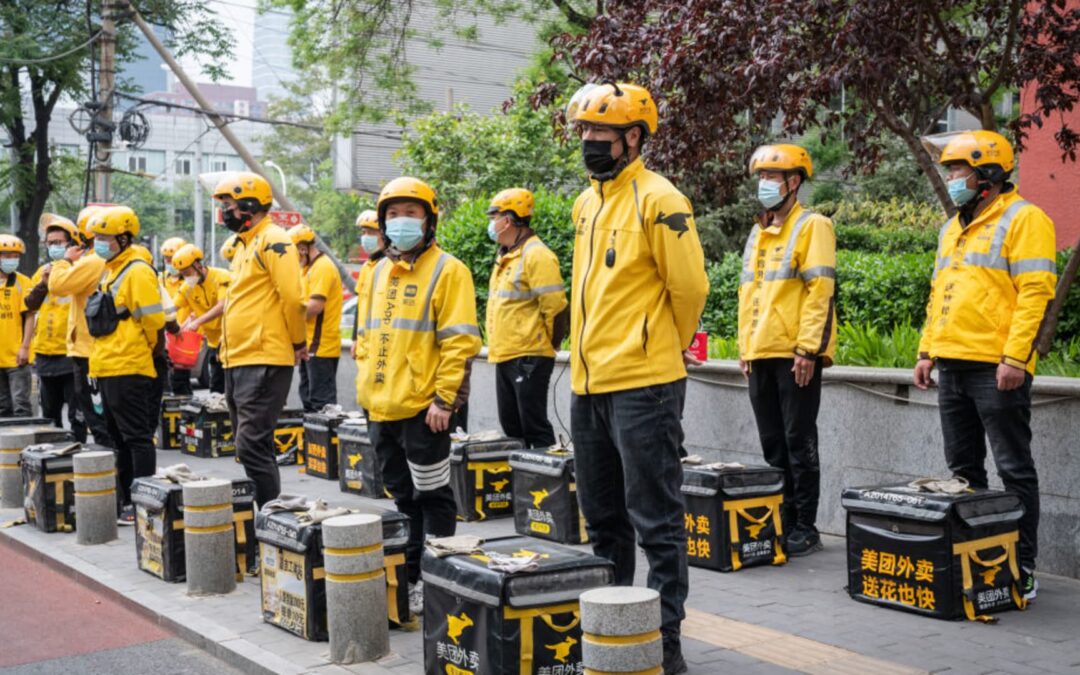Food delivery couriers for Meituan stand with insulated bags during a morning briefing in Beijing, China, on Wednesday, April 21, 2021.
Yan Cong | Bloomberg | Getty Images
Meituan‘s Hong Kong-listed shares fell more than 5% on Friday after CEO Wang Xing warned of a food delivery slowdown in the next quarter.
“For our food delivery, we expect the third quarter or the volume will slow down, but still be more resilient than other consumption-related sectors,” Wang said during the earnings call on Thursday.
On Thursday, Meituan posted strong second-quarter results.
Revenue was 67.96 billion Chinese yuan ($9.33 billion), up 33.4% from 50.93 billion yuan posted in the same period a year ago. The firm also swung to profit of 4.69 billion Chinese yuan for the second quarter, compared to a loss of 1.11 billion Chinese yuan a year ago.
“We have seen some short-term headwinds due to macro economy and extreme weather conditions.”
Regions such as Beijing, Tianjin and the provinces of Hebei, Shanxi and Henan experienced extreme rain in July, causing widespread flooding. Typhoon Doksuri swept north after ravaging southern Chinese provinces.
Consumers’ pent-up demand for offline consumption is further released, and this will lead to a temporary squeeze on food delivery transactions as people go out more often.
“Extreme weather brings challenges to our business. Many merchants had to suspend their business, while consumers chose to stock packaged food instead of ordering fresh food delivery. In some cities, food delivery was even suspended in order to ensure safety,” said Wang.
Meituan leads China’s food delivery market, holding almost 70% of the market share in the mainland, according to a 2022 report on Meituan.
Besides food delivery, the tech firm also operates various services including ride-hailing, on-demand delivery, hotel and travel booking, movie ticketing, entertainment and lifestyle services.
Xiaolin Chen, head of international at KraneShares, is bullish on Meituan.
The investment firm has a price target of 205 Hong Kong dollars ($26.14) on the stock, which represents a 35.2% upside from the current price of HK$132.80.
“They literally gained a lot of market share during [the pandemic]. They managed to grab lower tier cities and I believe [that] kind of market share will become sticky with them,” Chen told CNBC’s “Squawk Box Asia” on Friday.
Wang said consumers will likely dine out more as the economy recovers, which could lead to a lower demand for food delivery.
“So far in third quarter, offline traffic and travel demand continue to recover rapidly. Consumers’ pent-up demand for offline consumption is further released, and this will lead to a temporary squeeze on food delivery transactions as people go out more often,” said Wang.
China’s weak recovery
Credit rating agency Fitch Ratings still expects China’s gross domestic product to grow 5.6% in 2023 as the economy normalizes following very weak consumption growth last year, according to a July report. This is slightly higher than the Chinese government’s growth target of around 5%.
Meituan’s CEO said he remains confident of long-term growth in its food delivery business.
“Order volume in Q3 last year was a relatively high base, but we think a temporary slowdown in order volume growth is due to external factors,” said Wang. “We will continue to activate our product and operational strategy to better capture the demand and stimulate the recovery.”
Meituan is also deploying autonomous delivery vehicles which have been “more widely applied in more scenarios,” said Wang.
Chinese self-driving car firm Pony.ai announced in March that it is partnering Meituan to build unmanned vehicles for food delivery services.
Chen said that leveraging artificial intelligence tech in food delivery is key to “improving costs and services for clients.”
“We will leverage our proprietary research and external investment to explore the use of AI and autonomous delivery and other cutting edge technologies,” said Wang.
In May, Meituan rolled out a sister app in Hong Kong, as it looks for new markets outside of mainland China.







